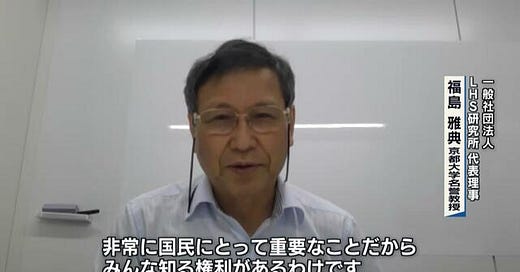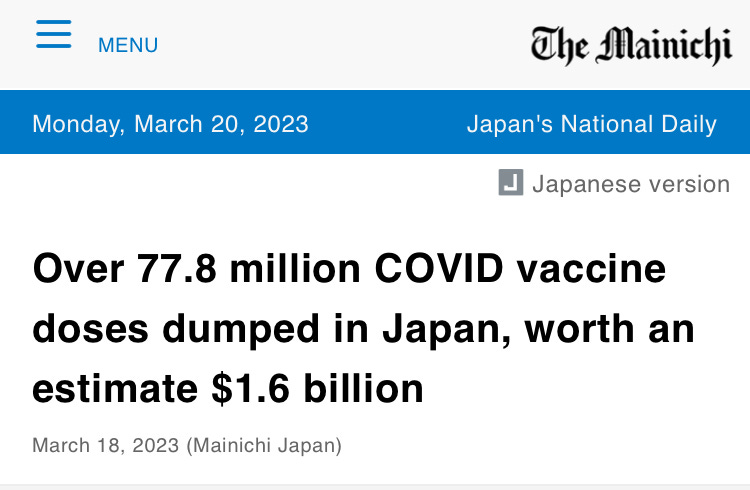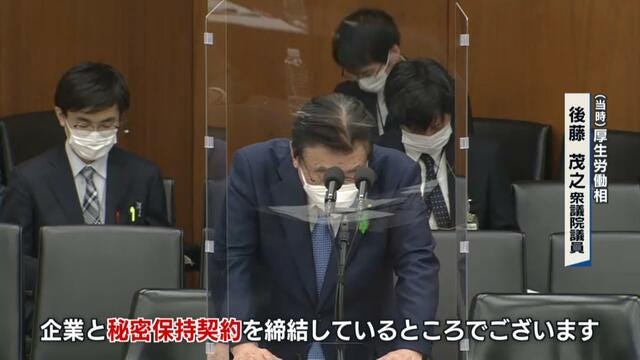As a vax-sceptical taxpaying resident of Japan, I was less than overjoyed to read the below headline.
I know the shots are better off in the incinerator than in the arm, but still. $1.6 billion is just an estimate since the actual purchase price isn’t publicly known.
The cost equivalent of 2,725 yen [approx US$20.70] per dose is specified in documents of a subcommittee of the Finance Ministry's Fiscal System Council. As the purchase budget for vaccines also includes shipping costs, it does not represent the actual vaccine prices. As the government has signed confidentiality agreements with drug makers, the actual purchase price per dose remains undisclosed.
Interestingly, AstraZeneca and Moderna account for the overwhelming majority of the discarded jabs. Hardly any Pfizer/BioNTech jabs have been thrown away even though far more of them were procured.
The Japanese government procured 399 million doses worth of Pfizer COVID-19 vaccines, 213 million doses from Moderna, 120 million doses from AstraZeneca (of which contracts for 62.3 million doses were later canceled), and 150 million doses from Novavax (of which 141.76 million doses were later canceled). Of those, the health ministry has disclosed that some 63.9 million expiring Moderna and 13.58 million AstraZeneca doses for conventional strains had been discarded…350,000 vaccine doses had been thrown away apart from the Moderna and AstraZeneca shots.
The AZ, Moderna, and Pfizer/BNT jabs all originally had 6 month expiry dates, but Moderna’s was extended to 9 months and Pfizer/BNT’s was extended to 18 months. So either (1) the quality of Pfizer/BNT’s mRNA jabs can be maintained for twice as long as that of Moderna’s or (2) the Japanese government has some undisclosed reason for giving Pfizer/BNT favourable treatment. I wonder which it could be?
If all this has made you interested in taking a look at the contracts for these shots, you’re not alone. Prof Masanori Fukushima of Kyoto University (who previously appeared on this blog here and here) recently asked the Ministry of Health, Labour and Welfare (MHLW) to release the purchase contracts made with the vaccine makers.
“Because this is exceptionally important for the people, we have a right to know. [The MHLW] needs to show us exactly how much the contracts were for, how much tax we paid for them, and what the effect was.”
Unsurprisingly, the MHLW refused, giving the following excuse.
Disclosure may harm the rights, competitive position, or other legitimate interests of the companies.
I sleep better at night knowing the MHLW is committed to protecting Pfizer’s “competitive position”.
This is not the first time the Japanese government has declined to clarify how much the jabs cost. In April 2022, then Minister of Health Shigeyuki Goto said the following in response to a question about the vaccine purchase price.
Companies may be at a disadvantage when negotiating with other countries [if we disclose price information]. As a result, we have concluded non-disclosure agreements with the companies to avoid a situation in which companies refuse to enter into agreements with Japan.
So if Japan discloses the details of the purchase contracts, Pfizer and Moderna might refuse to contract with Japan again in the future. I dunno about you, but that’s a risk I’m certainly willing to take.
Prof Fukushima is now planning a civil lawsuit to make the MHLW release the purchase contracts. Let’s wish him luck.







Prof. Fukushima should specify that he is healthy and not suicidal... for all matters and purposes...
I’d be interested to know who decides upon the arbitrary expiry dates of these “medicines” - how can they suddenly be extended? After the expiry date does the product become less efficacious, or does it become toxic? How can anyone know with these untested “vaccines”? Like everything else, it seems to be based on politics rather than any genuine interest in protecting health.